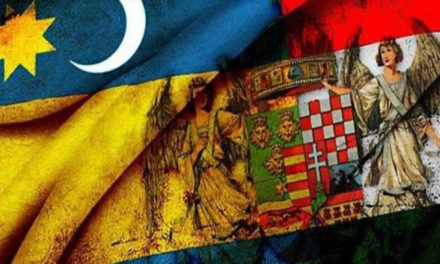President Klaus Iohannis responded to János Áder's much-publicized statement in Ukraine regarding the Trianon tragedy, presumably a month late, at the Charlemagne Prize awarding ceremony in Aachen. The Romanian president is "fed up" and "enraged" by the fact that the Hungarian politician is constantly messing with Trianon, it would be time to accept this!
This is what he, who himself is from Transylvania, says - and I quote - "the Romanians decided by vote in 1918 that Transylvania should unite with Romania". With this statement, Klaus Iohannis is pulling out the "Hungarian card" for the umpteenth time. Under the guise of the "Hungarian threat" classified as a national security risk factor, several generations of Romanian politicians lived and are surviving their own political crisis - at least a hundred years ago
Iohannis was born into a Saxon family. It's true, in a Saxon family that basically moved away from its roots already in the 1970s and, one might say, became Romanized. The fact that they could not or did not want to escape from Ceaușescu's Romania is an interesting story, but not many people have researched it either, after all, nowadays there is hardly anyone who does real research into the lives of politicians. The few investigative journalists and organizations that still have the capacity to do so are busy with so many things that little things like Klaus Iohannis' detailed research into every minute detail of his past before 1990 seem like side issues. Of course, Iohannis may have had Hungarian friends from this age, but we don't know too much about that.
Sibiu is not fundamentally a Hungarian city, it never was, so it is understandable that a Saxon born in Southern Transylvania could have somewhere neutral or even negative feelings towards Hungarians. Of course, there is no evidence for this, although we know that Saxons and Transylvanian Hungarians have not been on very good terms since 1848-49: the Stephan Ludwig Roth , the Magyarization of the dualist, Austro-Hungarian policy, and the gradual reduction of the autonomy of the Saxons unfortunately left their mark on Hungarian-Saxon relations too. One expression of this is the Medgyes assembly held on January 8, 1919, where the Saxons welcomed the unification. In their declaration, it is stated that "the Transylvanian Saxons, referring to the right of self-determination of the peoples, declare their accession to the Kingdom of Romania and welcome the Romanian people as brothers, and sincerely wish them luck in the realization of their national ideals".
Of course, it is well known that there was far from a consensus among the Saxons before the Medgyes declaration: in November and December 1918, great debates raged among the Saxon intelligentsia as to where they should be placed in the collapsed Austro-Hungarian Monarchy. This is clearly demonstrated by the fact that on October 29, 1918, the meeting of the Szasz Központi Tanács held in Sibiu voted in favor of loyalty to the Hungarian state. The Saxon National Council held negotiations with the Mihály Károlyi government in November, but some of the Saxons began to orient themselves more towards the Romanians. On November 25, 1918, the representative body of the Transylvanian Saxons decided not to commit themselves to the side of either the Romanians or the Hungarians. Between November 1918 and January 1919, the leaders of the Saxons changed their opinion for some reason and finally decided in favor of unification.
They did not like Friedrich Ipsen , who imagined Transylvania as a kind of canton on the Swiss model in the future Romania. Ipsen's plan was one of the federalist proposals circulating in 1918, which unfortunately could not fit into the Wilsonian visions of ethnicity and nation-state. The bottom line, however, is that in 1918-19 the Saxons did not vote for unification either: Iohannis' statement is therefore wrong. The leaders of the Saxons decided arbitrarily on this, there was never a vote of several thousand or hundreds of thousands, a referendum on the subject among the Saxons. Just as there was no referendum or vote among the Hungarians and Romanians either, although the latter's general assembly in Gyulafehérvár really represented a significant part of Transylvanian Romanians through its nearly 100,000 delegates.
Between 1919 and 1923, while the Paris peace treaties and negotiations were ongoing, referendums and referendums on the legitimacy of the new borders arbitrarily drawn by the great powers were held in very few settlements and small regions. Such was the case, for example, of the vote held in and around Sopron between December 14 and 16, 1921, where nine settlements voted on whether they wanted to belong to Austria or Hungary. Six of the nine settlements voted for Austria, but since Sopron voted for Hungary, all nine settlements remained part of Hungary. They didn't even dare to dream of such a thing in Partium, where dozens of small and large towns and their immediate surroundings were largely Hungarian (at least 50-60 percent, in the case of some towns 90 percent) back in 1919-20.

Johannis is as far from Europeanness as Makó is from Jerusalem (photo: Facebook)
For the generation that wakes up one morning in another country without a vote or a referendum, it was not a pleasant time. It was a losing war, the young people from the family were lost in the fighting, and those who survived woke up in another country in less than a year and a half. For many, of course, this was only perceptible in the administration, but hundreds of thousands of Hungarians - mainly the urban, intellectual and public administration strata - were directly and massively affected.
Klaus Iohannis hardly knows anything about this. Why would he know: even his parents didn't experience the trauma of Trianon, for him it's just historiography, which one inherits one way or another: some learn it as a tragedy, some learn it as a story of glory. Iohannis, who studied history during the Ceaușescu era in the 1970s, could by definition only know the propaganda story about Trianon.
However, the problem with his statement is not only its historical shortcomings and its false, metahistorical nature. Klaus Iohannis accepted an award in Aachen that was born in the spirit of Europeanism, the harmonious relationship between West and East and European peace. Iohannis followed in the footsteps of great predecessors such as Konrad Adenauer, Winston Churchill, Václav Havel, György Konrád. Henry Kissinger Jean-Claude Juncker, who is also known for his corruption scandals, received this award .) Iohannis' years-long taunting and arrogance towards the Hungarian community can now be said to have reached its "peak": the color of Europe proved before that he is actually as far from Europeanness as Makó is from Jerusalem. However, those familiar with Romanian political discourse are well aware that Iohannis did nothing other than what so many people use in politics today: he used the myth of the scapegoat and the common enemy. When the house is on fire - and everything is on fire in Romania right now, from the hospital to the parliament, from society to politicians - the president, clinging to the last shreds of his popularity, tries the ever-successful card we call the "Hungarian card". It was used by Brătianu , Ceaușescu, Iliescu, Vadim, Băsescu and many other Hungarian and Romanian politicians, regardless of political orientation or party.
This has been going on here for a hundred years: the Hungarians are good at being used as a national security risk to hold together the Romanian state, which otherwise has fluid structures and seems to be disintegrating. After all, if there was no other benefit to the annexation of 1.5 million Hungarians to Romania, this much is certain: it gives stability to a country that is searching for itself, flexible and currently on the verge of collapse due to the lack of structures.
Author: Csaba T. Szabó
(On the cover photo: Klaus Johannis cannot be accused of loving the Hungarians. Photo: Szabadság.ro)












